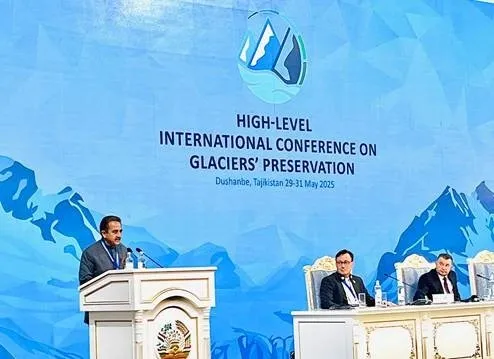Is India Committed to Glacier Preservation at Global Meetings?

Synopsis
Key Takeaways
- Glacier retreat is an immediate threat to billions, affecting water security and biodiversity.
- India emphasizes the importance of equitable climate action through the CBDR–RC principle.
- Strategic measures are being implemented under the National Mission for Sustaining the Himalayan Ecosystem.
- The International Year of Glaciers’ Preservation will be observed in 2025.
- Global cooperation is essential for glacier conservation and climate resilience.
New Delhi, May 31 (NationPress) The melting of glaciers poses an urgent threat to billions, stated Union Minister of State for Environment, Forest and Climate Change (EFCC), Kirti Vardhan Singh, while reiterating India’s dedication to glacier conservation. He addressed attendees at the Plenary Session of the High-Level International Conference on Glaciers’ Preservation, held in Dushanbe, the Republic of Tajikistan.
“The melting of glaciers is not just a warning; it is a pressing reality that affects water security, biodiversity, and the livelihoods of countless individuals,” Singh remarked.
The Minister highlighted that this phenomenon is accelerating, with severe consequences particularly affecting mountainous areas like the Himalayas.
In a broader context, the Minister reaffirmed India’s dedication to fairness and the principle of Common but Differentiated Responsibilities and Respective Capabilities (CBDR–RC) in global climate initiatives.
He pointed out that while South Asia contributes minimally to global emissions, it is extremely vulnerable to the impacts of climate change.
Singh also welcomed the announcement of 2025 as the International Year of Glaciers’ Preservation and the Decade (2025-2034) of Action for Cryospheric Sciences. He called for enhanced global collaboration, shared scientific studies, and increased financial and technological aid for developing nations.
“India is prepared to fortify partnerships, share knowledge, and play a vital role in collective efforts to protect glaciers and ensure a resilient future for all,” Singh asserted.
“India is implementing strategic measures under the National Mission for Sustaining the Himalayan Ecosystem (NMSHE)—a fundamental element of India’s National Action Plan on Climate Change (NAPCC)—and the establishment of a Centre for Cryosphere and Climate Change Studies, aimed at enhancing research and monitoring of glaciers and glacial lakes in the Indian Himalayan Region,” he added.
This event convened international experts, policymakers, and ministers to discuss urgent measures necessary to protect glaciers, which are essential freshwater sources and indicators of climate change.









